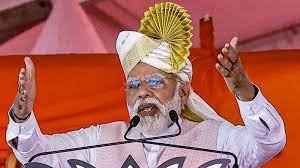Prime Minister Narendra Modi’s recent call for Karnataka voters to chant “Jai Bajrangbali” during the assembly polls on May 10 has raised eyebrows and sparked curiosity. This unprecedented move came in response to the Congress party’s manifesto promise to take action, including imposing a ban, on organizations such as the Bajrang Dal and Popular Front of India (PFI).
The equating of the Bajrang Dal with Lord Hanuman in the Prime Minister’s plea is a significant development, particularly considering the historical blend of religion and politics in the BJP’s election campaigns. This move brings the BJP’s complex relationship with the Bajrang Dal, a part of the Sangh Parivar, into sharper focus.
The Bajrang Dal is a right-wing Hindu nationalist organization that operates under the umbrella of the Sangh Parivar, an assortment of Hindu nationalist organizations. It was formed in the early 1980s and has been associated with promoting a Hindu agenda and protecting Hindu interests. The organization has been involved in various activities, including campaigns against religious conversions, cow protection, and promoting Hindu values.
The BJP, being a Hindu nationalist party, has had a long-standing association with the Bajrang Dal. Many members of the Bajrang Dal are also affiliated with the Rashtriya Swayamsevak Sangh (RSS), the ideological parent organization of the BJP. Over the years, the Bajrang Dal has provided the BJP with a support base of dedicated volunteers who actively participate in the party’s election campaigns and mobilize voters.
However, the BJP’s relationship with the Bajrang Dal has not always been smooth. The Bajrang Dal has been accused of engaging in vigilantism, promoting violence, and targeting religious minorities. These actions have often put the BJP in a challenging position, trying to balance its association with the Bajrang Dal while projecting a more moderate image to appeal to a wider voter base.
Prime Minister Modi’s call to chant “Jai Bajrangbali” during the Karnataka assembly polls can be seen as an attempt to consolidate the BJP’s support base among the Hindu majority voters, particularly those who align with the Bajrang Dal’s ideology. By equating the Bajrang Dal with Lord Hanuman, Modi is appealing to the religious sentiments of the electorate and sending a signal of support to the organization.
At the same time, this move has also raised concerns among critics who see it as a further blurring of the lines between religion and politics. India is a secular country with a diverse population, and the mixing of religion and politics can be polarizing and detrimental to the principles of democracy and pluralism.
The response to Prime Minister Modi’s call has been mixed. Supporters of the BJP and the Bajrang Dal have welcomed the move, seeing it as a reaffirmation of the party’s commitment to Hindu values. Critics, on the other hand, view it as a dangerous precedent that could further deepen religious divisions and undermine the secular fabric of the nation.
Prime Minister Modi’s call for Karnataka voters to chant “Jai Bajrangbali” during the assembly polls has brought the BJP’s relationship with the Bajrang Dal into the spotlight. It reflects the complex dynamics between the BJP and its affiliated organizations, highlighting the challenges of balancing religious identity with a broader political agenda. The move has generated both curiosity and concern, underscoring the ongoing debate over the intersection of religion and politics in India.


